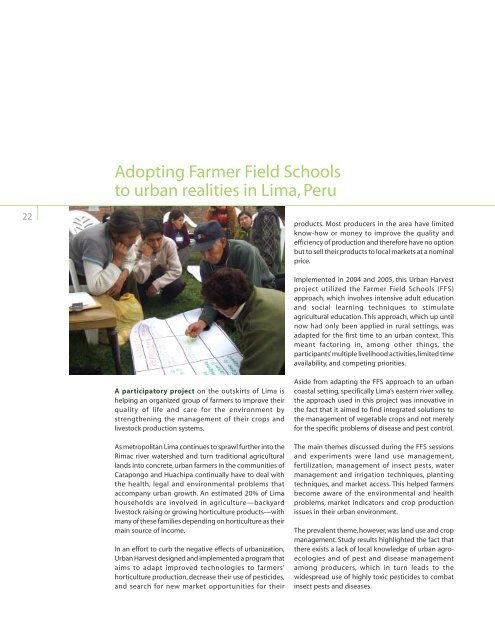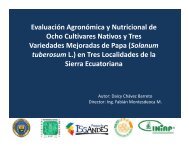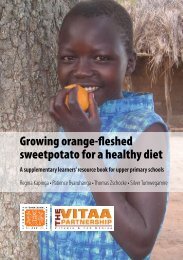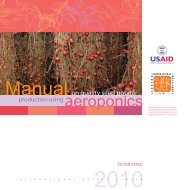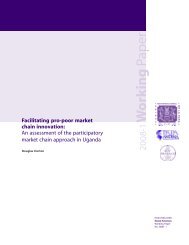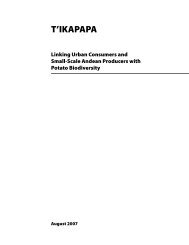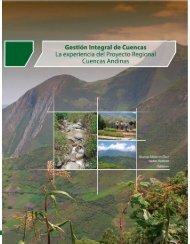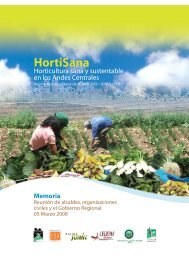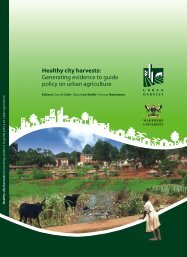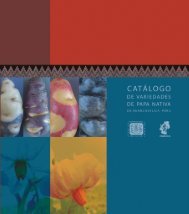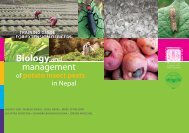Impacts of Urban Agriculture Annual Report.p65 - International ...
Impacts of Urban Agriculture Annual Report.p65 - International ...
Impacts of Urban Agriculture Annual Report.p65 - International ...
- No tags were found...
Create successful ePaper yourself
Turn your PDF publications into a flip-book with our unique Google optimized e-Paper software.
Adopting Farmer Field Schoolsto urban realities in Lima, Peru22products. Most producers in the area have limitedknow-how or money to improve the quality andefficiency <strong>of</strong> production and therefore have no optionbut to sell their products to local markets at a nominalprice.Implemented in 2004 and 2005, this <strong>Urban</strong> Harvestproject utilized the Farmer Field Schools (FFS)approach, which involves intensive adult educationand social learning techniques to stimulateagricultural education. This approach, which up untilnow had only been applied in rural settings, wasadapted for the first time to an urban context. Thismeant factoring in, among other things, theparticipants’ multiple livelihood activities, limited timeavailability, and competing priorities.A participatory project on the outskirts <strong>of</strong> Lima ishelping an organized group <strong>of</strong> farmers to improve theirquality <strong>of</strong> life and care for the environment bystrengthening the management <strong>of</strong> their crops andlivestock production systems.As metropolitan Lima continues to sprawl further into theRimac river watershed and turn traditional agriculturallands into concrete, urban farmers in the communities <strong>of</strong>Carapongo and Huachipa continually have to deal withthe health, legal and environmental problems thataccompany urban growth. An estimated 20% <strong>of</strong> Limahouseholds are involved in agriculture—backyardlivestock raising or growing horticulture products—withmany <strong>of</strong> these families depending on horticulture as theirmain source <strong>of</strong> income.In an effort to curb the negative effects <strong>of</strong> urbanization,<strong>Urban</strong> Harvest designed and implemented a program thataims to adapt improved technologies to farmers’horticulture production, decrease their use <strong>of</strong> pesticides,and search for new market opportunities for theirAside from adapting the FFS approach to an urbancoastal setting, specifically Lima’s eastern river valley,the approach used in this project was innovative inthe fact that it aimed to find integrated solutions tothe management <strong>of</strong> vegetable crops and not merelyfor the specific problems <strong>of</strong> disease and pest control.The main themes discussed during the FFS sessionsand experiments were land use management,fertilization, management <strong>of</strong> insect pests, watermanagement and irrigation techniques, plantingtechniques, and market access. This helped farmersbecome aware <strong>of</strong> the environmental and healthproblems, market indicators and crop productionissues in their urban environment.The prevalent theme, however, was land use and cropmanagement. Study results highlighted the fact thatthere exists a lack <strong>of</strong> local knowledge <strong>of</strong> urban agroecologiesand <strong>of</strong> pest and disease managementamong producers, which in turn leads to thewidespread use <strong>of</strong> highly toxic pesticides to combatinsect pests and diseases.


